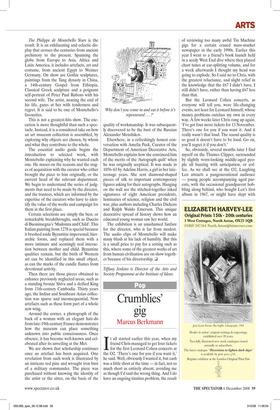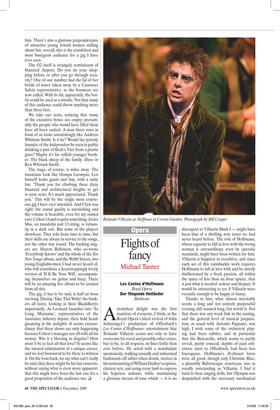Crumblies’ gig
Marcus Berkmann
It all started earlier this year, when my friend Chris managed to get four tickets for the first Leonard Cohen concerts at the O2. ‘There’s one for you if you want it,’ he said. Well, obviously I wanted it, but cash was a little short at the time — in fact, not so much short as entirely absent, avoiding me as though I’d said the wrong thing. And I do have an ongoing tinnitus problem, the result of reviewing too many awful Tin Machine gigs for a certain crazed mass-market newspaper in the early 1990s. Earlier this year I went to a friend’s book launch held in a seedy West End dive where they played chart tunes at ear-splitting volume, and for a week afterwards I thought my head was going to explode. So I said no to Chris, with the greatest reluctance, and slight relief in the knowledge that the £67 I didn’t have, I still didn’t have, rather than having £67 less than that.
But the Leonard Cohen concerts, as everyone will tell you, were life-changing events, not least for Leonard himself, whose money problems outclass my own in every way. A few weeks later Chris rang up again. ‘I’ve got four more tickets for 13 November. There’s one for you if you want it. And it really wasn’t that loud. The sound quality is so good it doesn’t have to be loud. Go on, you’ll regret it if you don’t.’ So, obviously, several months later I find myself on the Thames Clipper, surrounded by slightly worn-looking middle-aged people all buzzing with anticipation, or coffee. As we shall see at the O2, Laughing Len attracts a pangenerational audience — young people accompanying aged parents, with the occasional grandparent hobbling along behind, who bought Len’s first album in 1967, or might have slept with him. There’s also a glorious preponderance of attractive young Jewish women milling about but, overall, this is the crumbliest and most bourgeois audience for a gig I have ever seen.
The O2 itself is strangely reminiscent of Stansted Airport. Do you do your shopping before or after you go through security? One of our number had the lid of her bottle of water taken away by a Customer Safety representative, as the bouncers are now called. With its lid, apparently, the bottle could be used as a missile. Not that many of this audience could throw anything more than three feet.
We take our seats, noticing that many of the executive boxes are empty: presumably the people who would have filled them have all been sacked. A man three rows in front of us looks astonishingly like Andreas Whittam Smith. Is it he? Would the priestly founder of the Independent be seen in public drinking a pint of Beck’s Vier from a plastic glass? Maybe it’s his raffish younger brother. The black sheep of the family. Dave or Ken Whittam Smith.
The stage, of course, is miles away. The musicians look like Oompa Loompas. Len himself looks gaunt and tiny, with a natty hat. ‘Thank you for climbing these dizzy financial and architectural heights to get to your seats. It’s much appreciated. Thank you.’ This will be the single most courteous gig I have ever attended. And Chris was right: the sound quality is astonishing and the volume is bearable, even for my ruined ears. Cohen’s band is quite something. Javier Mas, on mandolin and 12-string, is virtuosity in a dark suit. But none of the players showboat. They solo from time to time, but their skills are always in service to the songs, not the other way round. The backing singers are Sharon Robinson, who co-wrote ‘Everybody Knows’ and the whole of the Ten New Songs album, and the Webb Sisters, two young Englishwomen I had never heard of, who will contribute a heartstoppingly lovely version of ‘If It Be Your Will’, accompanying themselves on guitar and harp. There will be an amazing live album to be created from all this.
The gig, it has to be said, is half an hour too long. During ‘Take This Waltz’ the bankers all leave, looking at their BlackBerrys importantly. As Leonard launches into ‘So Long, Marianne’, representatives of the insurance industry depart, their bald heads gleaming in the arclights. It seems extraordinary that these shows are only happening because Cohen’s manager ran off with all his money. Was it a blessing in disguise? How must it be to feel all that love? It seems like the natural culmination of a unique career, and we feel honoured to be there to witness it. On the boat back, we say what can’t really be said, that these might be his last concerts, without saying what is even more apparent: that this might have been the last one for a good proportion of the audience too. ❑



















































































 Previous page
Previous page